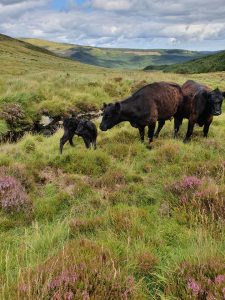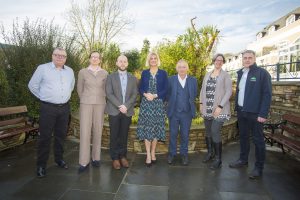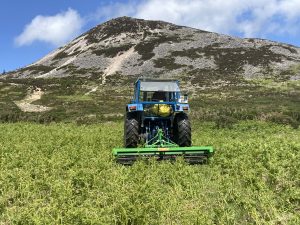Article first published in:
Wicklow Mountain Views – The Newsletter of the Wicklow Uplands Council.
Issue No. 31 – Winter 2022
Conclusion Of The SUAS Project

A black galloway heifer and calf on Corrasillagh Commonage where the mixed grazing initiative greatly assists with reducing molina grass and bracken.
As crowds gathered in the Glendalough Hotel in 2018, for the official launch of the ‘Sustainable Uplands Agriculture-environment Scheme (SUAS)’ Project, there was a collective sense of excitement at the journey that was about to commence.
Taking shape over the preceding years, beginning with the formation of a vegetation committee in 2011, it culminated in the news that the SUAS Project had been successful in the second round of the European Innovation Partnership for Agricultural Productivity and Sustainability (EIP-AGRI) projects – part of the European Union’s strategy to foster innovation within farming and forestry sectors.
The objectives of the project were ambitious and the Operational Group (OG) formed by Wicklow Uplands Council to oversee their successful delivery, presented an impressive picture to the assembled audience on how each of them would be met.
The Group, made up of representatives from organisations such as Wicklow Uplands Council, Teagasc, National Parks & Wildlife Service, Local Authority Waters & Communities Officer (LAWCO), shared a vision that addressed many of the challenges experienced in the Wicklow and Dublin Uplands; widespread biodiversity loss, damaged habitats and water courses, declining farming activities and associated income, and perhaps more telling, the absence of an interconnected plan to reverse them.
The proposed solutions, many of which were a combination of more traditional collaborative farming methods and science-led techniques, were innovative, yet simple in their delivery. Local hill-farmers who had cared for the hills over generations, would be remunerated for actions that improved sensitive upland habitats, while fostering collaboration and partnerships with fellow farmers and other stakeholders to achieve shared conservation goals. One of the unique aspects to the Project was the development of a process to assist commonage stakeholders to participate as a formal, collective group.

Minister Pippa Hackett along with the SUAS Project Team and invited speakers at the SUAS Project Conference held recently at the Glenview Hotel.
PROJECT CONFERENCE
Fast forward five years, many of those who gathered in the Glendalough Hotel, were meeting once again – this time for the SUAS Project Conference organised to coincide with the Project’s conclusion at the end of 2022. It was in this setting at the Glenview Hotel, that the extensive learnings emerging from the Project were openly shared and discussed with all of the diverse stakeholders present.
The event programme included a keynote presentation from Minister of State for Land Use and Biodiversity, Senator Pippa Hackett, international guest speakers, Professors Julia Aglionby and Davy McCracken, with Irish-based journalist and broadcaster, Ella McSweeney kindly filling the role of Conference Host. To demonstrate some of the landscape actions implemented through the Project, a field trip to a nearby site that’s implemented landscape actions overseen by SUAS, featured the day beforehand.
The SUAS Project team made up of Declan Byrne, Project Manager; Faith Wilson, Consultant Ecologist and Brian Dunne, Coordinator of Wicklow Uplands Council, delivered an overview of the Project ’s extensive activities across the region, as well as leading detailed discussion on the many outcomes and learnings discovered over the last five years.
PROJECT IMPLEMENTATION
As envisaged, individual hill-farmers and commonage groups inducted to phases one (2019) and two (2020), developed an agreed land management plan unique to their farmland by working alongside Faith Wilson and the Project Team. Focussing on sustainability, improved biodiversity, and if relevant, water quality, these multi-year management plans formed the basis of the programme of work to be carried out.
Thanks to the knowledge and insights discovered, the Project found itself in the very welcome position of being able to launch a third phase in 2021. Focussed solely on targeted habitat actions, it brought the total number of sites throughout the Wicklow and Dublin Uplands to 25.
Exceeding initial expectations, 75 farmers operating on over 7,500 hectares – much of which is designated Special Areas of Conservation (SAC) – have now actively participated with various initiatives introduced by SUAS
The conference audience heard from Declan Byrne, that done correctly, grazing practices are the most basic and effective management tool that can be implemented to both enhance and protect the uplands – essentially a return to many of the traditional farming techniques that were once commonplace.
By applying the principle of what he refers to as the ‘Four R’s’, upland habitats would return to a better and easier managed state if the Right Numbers; Right Type Of Stock (sheep and/or cattle); Right Time Of The Year (stock are on the hills) and selecting the Right Areas Of The Hills To Be Grazed.
Extending beyond sheep, a number of sites introduced cattle to observe how their heavier and uneven grazing assists with greater vegetation control and the natural formation of a mosaic of habitats. To great success, breeds such as Dexter cattle – a rare native Irish breed – are on the hills having been fitted with ‘Nofence’ virtual fence collars that utilise the technology of GPS and remote mapping to define an area of the hill for grazing.
Over 4,000 saplings of native Oak, Rowan, Willow, Alder & Birch, have been planted over the last 24 months, often alongside upland brooks and streams to ensure soil stability, protect water quality and to slow its descent. Planted in clusters, they will soon provide both shelter and a food source for wildlife, and in time, become a local seed source to expand habitats further.
Invasive tree species have been removed from sites such as Glencap Commons that surrounds the Great Sugar Loaf, where conifers which had spread from nearby plantations, were rapidly taking over the slopes.

Bracken ‘Bruising’ activities taking place on Glencap Commons next to the Great Sugar Loaf this summer.
VEGETATION MANAGEMENT
Eager to trial new techniques practiced in the UK, the project imported three ‘Bracken Bruisers’ to disrupt and reduce bracken growth. Perhaps for the first time in Ireland, the tractor-mounted unit and two quad-mounted units, work by damaging and weakening the stem and root network of the plant, ultimately reducing its spread. Other mechanical and chemical approaches were deployed on sites not suitable for a mounted unit.
The audience heard that the largest single threat to fragile upland ecosystems is almost certainly wildfires; which scar the landscape, destroy habitats and wildlife, and reduce the high-nature values needed to support productive grazing. Although training and small-scale, low-intensity controlled burning demonstrations featured in early land management efforts of the Project, it is hoped that the combination of mechanical controls and appropriate grazing techniques will minimise its usage.
Shared Learning and Knowledge Exchange have remained core pillars to the Project, and indeed features strongly across the entire EIP network. For the SUAS Project, training programmes and demonstrations were organised to support and guide farmers on a host of topics such as water quality, controlled burning, livestock selection and grazing methods. As part of the public engagement commitments, several guided walks on participating farmland were also organised to provide first-hand experience of the Project and to meet the parties involved.
Belonging to the European-wide network of EIP-Agri projects totalling several thousand, SUAS has hosted several groups visiting Ireland as part of research programmes. Conversely, study visits were also organised for hill-farmers participating in SUAS, with 22 recently joining the project team on a full two-day itinerary to county Antrim, where they visited a number of farmland settings and impressive conservation projects.
Undoubtedly, the Project’s many achievements can be largely attributed to project manager, Declan Byrne – who joined from Teagasc; ecologist Faith Wilson, the host of experts that contributed to the Operational Group’s role and of course Wicklow Uplands Council, whose perseverance and determination to develop and deliver this multi-stranded project ensured it would happen.
Instrumental to achieving the Project’s extensive scope, was the great level of support and guidance received from NPWS, the Department of Agriculture and many other stakeholders. However, at the centre of the success, are the farmers, who fully embraced the opportunity with enthusiasm, commitment and a heart-felt desire to achieve meaningful and long-term impact to the lands they farm.
FUTURE STEPS
The hosting of a conference event at the end of November, represents the beginning of the final stages of the project with the desire to share, discuss and explore the topics within the public domain.
The SUAS Project has offered a framework of how agri-environmental schemes can be successfully implemented to achieve shared conservation goals, create income for the farming community and foster better relationships between the multi-stakeholders essential to delivering meaningful and systemic change to the uplands.
Although the future of the formal framework established through the SUAS Project is at present unknown, its outcomes may in time influence policy adoption at regional and national levels, and perhaps within EU structures too.
Its true legacy however, will be felt on the hills, where farmers who once worked independently, have now experienced the benefit of working collaboratively and productively with others, and in partnership with nature to ensure our great natural assets are appropriately and sustainably managed for future generations.
Pat Dunne,
Project Lead of the SUAS Operational Group
Videos of the presentations and panel discussion at the recent SUAS Project Conference are available to view on the Wicklow Uplands Council website. The Final Report and supporting documentation will be published in due course. Photos featured in this article appear courtesy of Mick Kelly and Declan Byrne.
Ireland’s European Innovation Partnership (EIP) projects are funded by the Department of Agriculture, Food, and the Marine (DAFM) under the Rural Development Programme 2014-2020.

Newsletters Available Online
This newsletter and many of the previous publications are available online to view and download as PDF files directly from the Wicklow Uplands Council website.
CLICK HERE for this issue – Winter 2022.
CLICK HERE to view the full selection of newsletters dating back to 2006.


